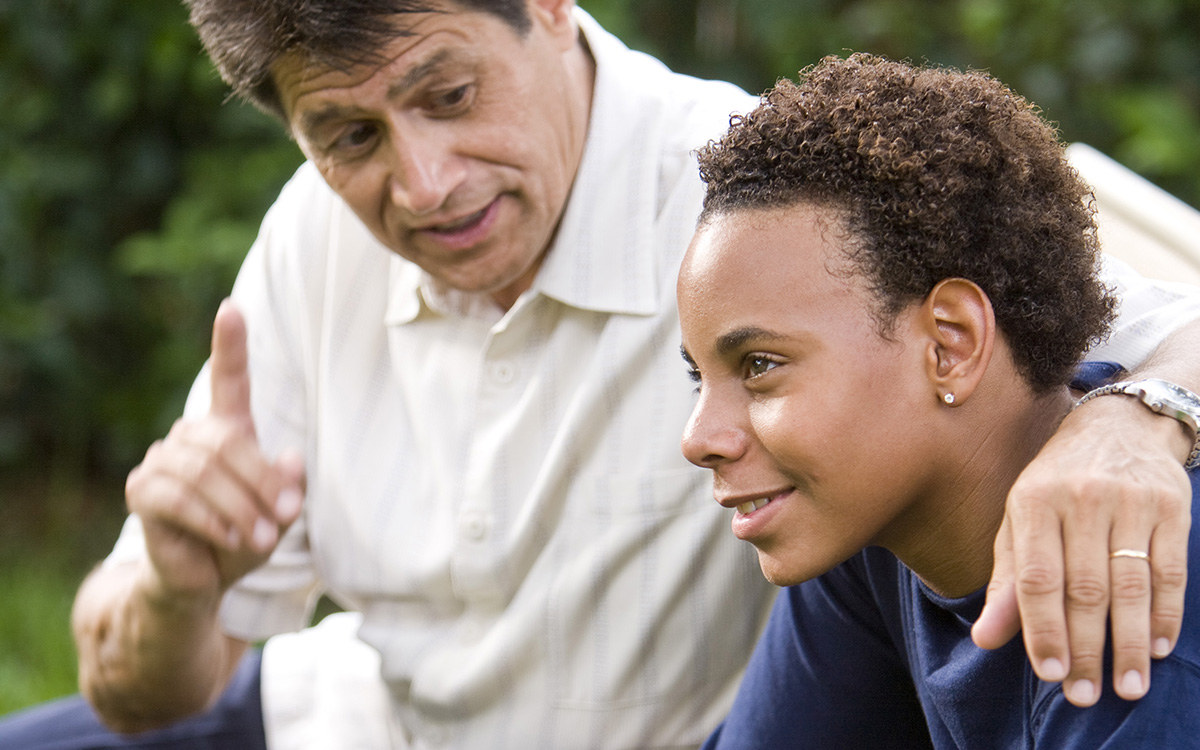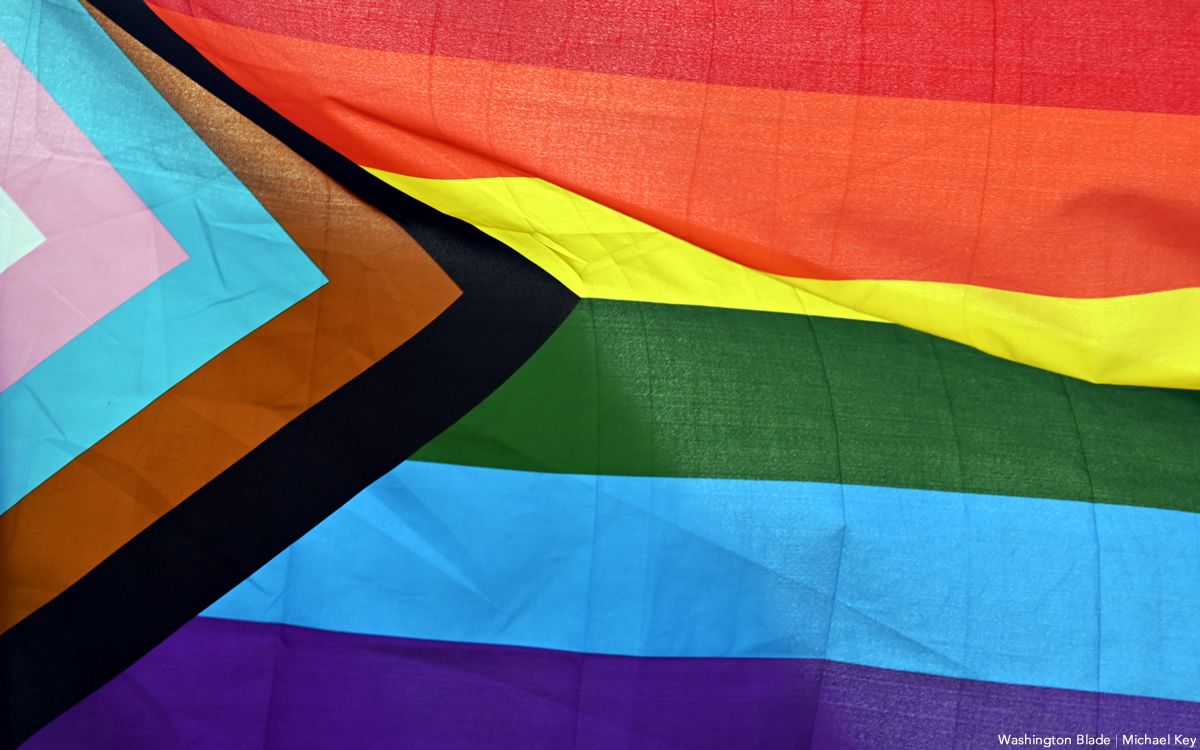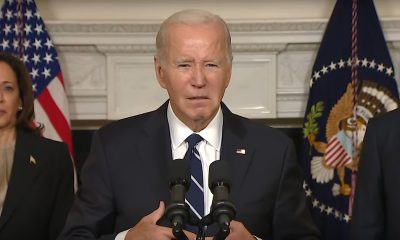Opinions
Fathers should speak to kids about drugs, alcohol
Highlight dangers of illicit substances, how to manage peer pressure

What does it take to be a good father? While there are many answers, it generally involves showing up daily, playing an essential role in their life, being there for them, and loving them unconditionally.
Fathers are there to provide abundant love and support. Most fathers know the sacrifice it takes to ensure their children are loved and cared for. A father is always there for their kids, offering guidance, support, and education. The greatest joy for any father is seeing their children thrive, do well in life, and be healthy.
However, things can get derailed in life, and teens and young adults take risks, such as experimenting with drugs or alcohol. Fathers have a responsibility to speak to their kids about drugs and alcohol and help them understand the risks and consequences.
Data has shown that more than half of LGBTQ youth used alcohol in the last year, and more than one in three LGBTQ youth used marijuana in the previous year. Approximately 11% of LGBTQ youth reported regular use (defined as daily or weekly use) of both alcohol and marijuana.
Illegal drugs today are more readily available than ever before. According to the DEA, drug traffickers have turned smartphones into a one-stop shop to market, sell, buy, and deliver deadly fake prescription pills and other drugs. Amid this ever-changing age of social media influence, kids, teens, and young adults are easily influenced.
Drug traffickers advertise on social media platforms like Instagram, Snapchat, TikTok, Twitter, YouTube, and Facebook. The posts are promptly posted and removed with code words and emojis used to market and sell illicit drugs. Unfortunately, digital media provides an increased opportunity for both marketing and social transmission of risk products and behaviors.
Fathers are responsible for protecting and preparing our children for the world. Drug education is essential. Take the time to speak to your kids about the dangers of illicit substances, how to avoid and manage peer pressure, and what to look for. Be prepared to share personal experiences and help them understand that some choices have consequences.
However, it can be challenging to see our kids struggle with things in life, and as fathers, we can also face our own difficulties, making it more difficult to help our children. The responsibility of raising children can be a lot; there are many challenges along the way, and the pressure of being a good influence can get the best of us.
All of this makes it vital not to ignore our mental health; children, especially younger kids, mimic what they see. How we cope with frustration, anger, sadness, or isolation impacts our children in several ways.
Our actions have consequences. Children see how we handle every situation, and while no father is perfect, we must be conscious of the fact they are impressionable when they are young. They look up to us, mimic our actions, and see when we are doing well in life mentally.
The key for fathers caring for children is to take the time to care for themselves. However, if you are struggling, contact the 988 Suicide and Crisis Lifeline. Taking care of your mental health is the same as taking care of your physical health; it is an integral part of your well-being and contributes to you being the best father you can be.
Nickolaus Hayes is a healthcare professional in the field of substance use and addiction recovery and is part of the editorial team at DRS. His primary focus is spreading awareness by educating individuals on the topics surrounding substance use.
Opinions
As fewer anti-LGBTQ bills pass, the fight gets harder
A growing indifference to suffering that is baked into the legal system

In recent years, advocates have faced an unprecedented avalanche of anti-LGBTQ legislation each spring. In 2024, however, the onslaught seems to have faltered somewhat. While hundreds of anti-LGBTQ bills were once again introduced, as many state legislative sessions draw to a close, fewer bills have been enacted into law.
While that may seem like cause for celebration, it’s also cause for concern.
To be sure, the slowdown in anti-LGBTQ legislation is welcome. Beginning in 2020, legislation targeting transgender rights in particular had sailed through state legislatures, with the number and scope of hostile bills increasing each year. Unlike earlier years when one or two prominent anti-LGBTQ bills triggered a national pushback that often chastened lawmakers, hundreds of bills have been introduced during legislative sessions in the last four years, often with little debate or scrutiny, and dozens of them zealously passed into law.
Those bills do real damage when they are enacted, cutting LGBTQ people off from material benefits like health care and domestic violence shelters, recognition by the state, and equal participation in public life. Even when they fail to become law, they have devastating effects on the mental health of LGBTQ people, throwing their lives into disarray and sapping valuable time and energy from LGBTQ communities. This especially affects children, with more than 90 percent of LGBTQ young people in a recent Trevor Project survey reporting that politics had negatively affected their personal well-being.
But the recent slowdown, far from being a positive signal, may well reflect a growing indifference to the suffering of LGBTQ people that is now baked into the political and legal system. Opponents of LGBTQ rights have normalized hostile rhetoric and enacted draconian laws that seemed unthinkable just a couple of years ago, and even ardent supporters of equality find themselves unsure how they might reverse state laws that unapologetically strip away LGBTQ rights.
If anything, it has become apparent that the damage that has been done since 2020 will most likely reverberate for a generation, and the past year shows that restoring and advancing LGBTQ rights will be a painstaking endeavor.
And one sobering reason for the slowing pace of anti-LGBTQ legislation is that, at this point, many conservative states have already stripped away important rights, particularly for transgender children. As of 2024, half of the states in the U.S. prohibit transgender girls from playing school sports, and half have banned or criminalized at least some forms of medically indicated healthcare.
Put differently, lawmakers aren’t targeting some rights this year because they’ve already eviscerated them.
Yet even as the pace of legislation slows, critical rights continue to be stripped away. According to the ACLU, more than 30 anti-LGBTQ bills have been enacted in 2024 — fewer than the 84 enacted in 2023, but still far too many. Among them, Utah and Mississippi restricted transgender people from accessing bathrooms and locker rooms in public schools and other government buildings.
Lawmakers in Ohio overrode the governor’s veto to ban transgender children from receiving gender-affirming care or playing sports consistent with their gender identity. South Carolina and Wyoming similarly enacted blanket bans preventing transgender children from accessing gender-affirming care.
Many of the bills that have been introduced this year sought to expand existing anti-LGBTQ legislation in new ways. Alabama, for example, successfully expanded its bathroom ban from K-12 schools to colleges and universities. Even those that didn’t pass are in many cases likely to be reintroduced after the 2024 election, particularly if anti-LGBTQ lawmakers increase their showing in state legislatures or if governors who are supportive of LGBTQ rights are no longer positioned to veto hostile legislation.
In many states with anti-LGBTQ legislation, administrative and regulatory agencies are being used to curtail LGBTQ rights even further. Florida offers an instructive example. Even after years of anti-LGBTQ legislation, the Florida Department of Highway Safety and Motor Vehicles took things a step further within its mandate, and decided in 2024 that transgender people could no longer update the gender marker on their driver’s licenses. This echoes recent regulatory crackdowns elsewhere in the United States, from the Texas Department of Family and Protective Services investigating parental support for transgender children as child abuse to school boards across the country stripping away lifesaving resources in schools.
And while many believed that courts would provide a bulwark against discriminatory legislation and regulations, in part because of strong Supreme Court precedent to suggest that anti-transgender discrimination is a form of sex discrimination, that has not consistently been the case. Trial courts have largely found in favor of transgender litigants, criticizing the insufficient justification and discriminatory purpose of anti-transgender laws, but some appellate courts have nevertheless allowed the laws to take effect.
Perhaps most alarming, there are advocates and lawmakers who, if in a position to do so, are eager to carry out an even harsher attack on LGBTQ rights. Project 2025, which a group of conservative organizations has drafted as a roadmap for a second Trump administration, promises an even more draconian attack on LGBTQ rights. This would include rolling back existing nondiscrimination protections for LGBTQ people, reinstating the transgender military ban, and codifying state restrictions on transgender rights at the federal level, in addition to limiting recognition of same-sex relationships.
The anti-LGBTQ backlash may be waning in certain respects — but in other ways, it has only just begun. As we celebrate Pride, LGBTQ people and their allies should be mindful of the need to support those communities whose rights are being eroded, invest in transgender rights organizing, demand that lawmakers prioritize LGBTQ rights, and fight for the independent institutions and protections for basic freedoms that are essential to hold power to account.
Ryan Thoreson is a specialist on LGBTQ rights at Human Rights Watch and teaches at the University of Cincinnati College of Law.
Commentary
LGBTQ people deserve freedom, a sense of home, and belonging
Latoya Nugent found refuge in Canada after fleeing Jamaica

Seven years ago, my fight for queer liberation in notoriously homophobic Jamaica culminated in a violent and brutal unlawful arrest and detention. This was the peak of decades of persecution due to my sexual orientation and work as a queer human rights defender and activist. It completely broke me and silenced me. I suffered severe emotional trauma, from which I am still recovering years later.
Following that life-threatening arrest, I became a shell of who I once was. I cut off communication with my community for several years, unable to face my fear of the police and the hostility of the world around me.
In 2022, I was one of the 9,591 at-risk LGBTQI+ people who reached out to Rainbow Railroad for help. Through the organization’s Emergency Travel Support (ETS) program, which relocates at-risk LGBTQI+ people and helps them make asylum claims in countries like the U.S., I resettled in Canada where I’ve been living safely with dignity and pride.
This Pride Month, I’m reflecting on what it means to be safe. Who has access to safety and why others are excluded from it. What is our collective role and responsibility in expanding safety for our queer and trans communities, especially those in the over 60 countries that criminalize LGBTQI+ people?
Safety means different things to different people depending on our experiences and journeys. For me, it’s the difference between suffering and thriving, feeling worthless and worthy, and feeling hopeless and hopeful. It is the difference between displacement and belonging.
Rainbow Railroad recently released a report that examines the state of global LGBTQI+ persecution, drawing on data from 15,352 help requests spanning 100+ countries. This report is significant for several reasons, chief among them is the reality that no other organization or government captures the breadth and depth of data on LGBTQI+ forced displacement, perpetuating the invisibility of queer individuals in humanitarian responses. The report is an important contribution to the discourse on the intersection of queer identity, LGBTQI+ persecution, forced displacement, and humanitarian protection systems.
Of all the data and insights uncovered in the report, I was most struck by one statistic — 91 percent of at-risk LGBTQI+ individuals relocated through the ETS program reported an improved sense of personal safety. This statistic is particularly personal to me because ETS was the only relocation option accessible to me in 2022 when I reached out to Rainbow Railroad for help.
I am in that 91 percent because I am now thriving. I feel worthy. I am hopeful about life. And I belong.
Today, among the 120 million forcibly displaced people around the world, queer and trans individuals face compounded complications from homophobia and transphobia while trying to access protection and safety. And while the anti-gender movement continues to swell in some states, I firmly believe that the U.S. remains a global leader in refugee resettlement — which is why the U.S. government must uphold its international obligations and reverse its recent executive order that imposes severe restrictions on the right to seek asylum.
Queer and trans individuals deserve freedom, a sense of home, and belonging — realities that flourish only when rooted in the bedrock of safety.
There is a lot more work to be done. It’s challenging. It’s complex. It’s costly. But I have experienced firsthand what the transformative impact of Rainbow Railroad’s work has on someone’s life — that ability to lift people out of danger into safety is something worth celebrating this Pride.
Latoya Nugent is the head of engagement for Rainbow Railroad.
Opinions
We are proud of who are. No law can take that away from us
Uganda’s Anti-Homosexuality Act signed in 2023

For close to two decades now, I have witnessed the never-ending brutality and stigmatization of key populations, not only in Uganda but across the global Black community.
For too long, LGBTQI+ people in Uganda and across the African continent have been subject to discrimination, social exclusion, and prosecution, which restricts their access to jobs, health care, and much more.
A toxic concoction of prejudice and legislation, including Uganda’s 2023 Anti-Homosexuality Act (AHA), has driven the LGBTQI+ community underground.
In Uganda today, LGBTQI+ people are less likely to seek out necessary, lifesaving services like HIV prevention and treatment. Drug users are regularly denied necessary harm reduction treatments. Sex workers are routinely targeted for assault and extortion by clients and by the police.
Throughout the continent, marginalized communities are contending with intersecting forms of discrimination based on socioeconomic class, gender identity, and sexual orientation.
And so, the cycles of poverty and marginalization roll on, health inequities widen, HIV and other illnesses can spread, and mental health and general well-being suffer.
We founded the Uganda Key Populations Consortium (UKPC) in 2018 to put a stop to all this — to challenge draconian laws like the AHA and advocate for equity and equality for key populations.
Back then, so many of us didn’t have a home — a place where we could sit together and say: This is what we, as a people, need and stand for.
UKPC brings together LGBTQI+ people and people from other key populations to express themselves, learn and build community. We work with partners to create safe spaces — drop-in centers — across the country, where our community can connect, access health services, and make their voices heard.
Thanks in large part to these drop-in centers, we saw a huge increase in the number of people starting antiretroviral therapy, using HIV self-testing tool kits and taking steps to prevent sexually transmitted infections.
We also establish strong relationships with civil society, nongovernmental organizations, and government partners that support us and our work to serve our community, despite constant challenges.
Today, all our work is under threat.
The AHA encourages violent abuse and discrimination against my community. A recent report paints a grim picture: since the AHA was passed, Uganda’s LGBTQI+ community has suffered 434 evictions and banishments, 309 incidents of violence, 92 recorded instances of mental health distress, and 69 arrests.
The law also threatens people supporting LGBTQI+ communities and those providing or seeking basic health services.
Our community organizations have closed dozens of drop-in centers, shutting down a critical link between individuals and their peers — not to mention essential mental and physical health care. We have diverted much-needed funds to make our offices and meeting places safe and secure. We can’t be sure that reaching people online is safe, and that their data and identities will be protected.
Still: we are fighting back. I am fighting back. Our community is fighting back.
Changing the status quo will require more work and support. We need partners like the Global Fund and its Breaking Down Barriers initiative, because those programs empower communities to lead — and give us a voice. They also give us a platform for collective action, to continue working against the violence and hatred that, some days, feels inescapable.
When communities come together, change is possible.
Pride is a moment to celebrate — and to protest. Every June, I take a moment to close my eyes and focus inward, to honor myself and the community that made me. To think about what we’ve accomplished, and the work still left to do. This year is no exception.
We are proud of who we are. No law can take that away from us.
Richard Lusimbo is the founder and director general of the Uganda Key Populations Consortium, and a longtime LGBTQI+ and human and health rights activist. UKPC is a partner of the Global Fund’s Breaking Down Barriers initiative, which aims to reduce human rights-related barriers to health.
-
The White House2 days ago
HISTORIC: Biden pardons discharged LGBTQ veterans
-
a&e features2 days ago
Queer TV anchors in Md. use their platform ‘to fight for what’s right’
-
Virginia4 days ago
Suspect in 1996 murder of lesbian couple in Shenandoah National Park identified
-
Local4 days ago
Camp Free2Be helping trans youth find community
















